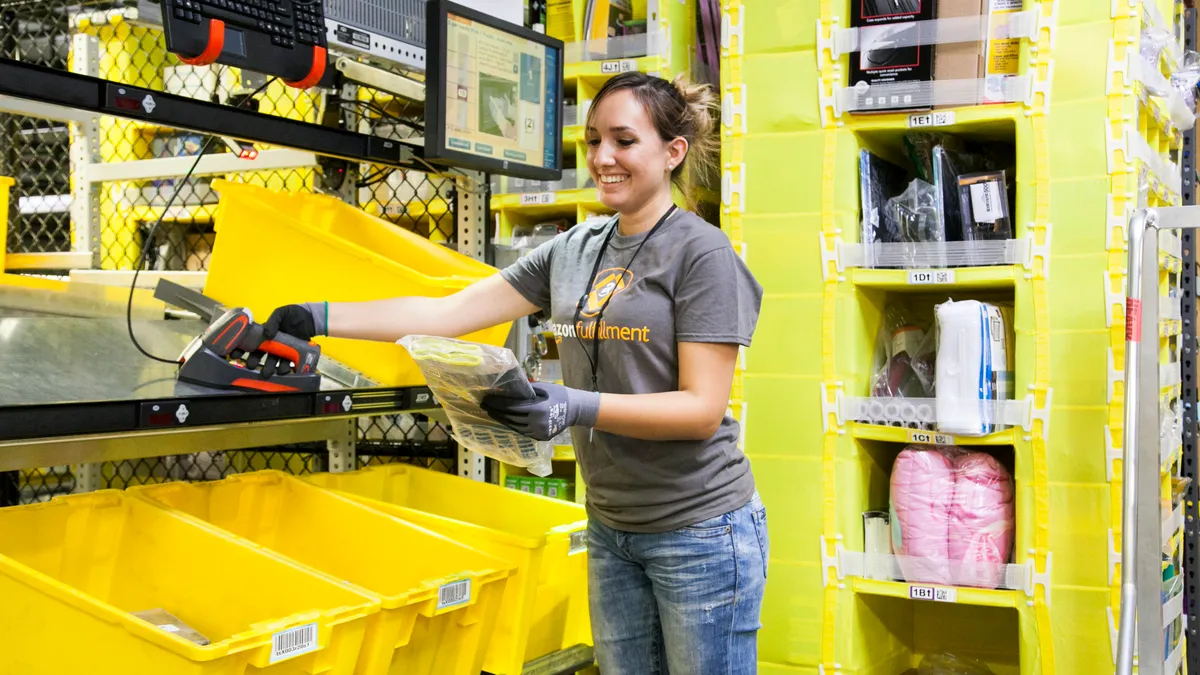Dive Brief:
-
A number of Amazon Marketplace sellers have received emails notifying them of a change to its return policy for sellers not leveraging the e-commerce giant’s Fulfillment by Amazon program — a free return policy that supersedes a seller's own return policy.
-
Effective Nov. 1, U.S. seller-fulfilled returns that are not within Amazon's returns policy will be automatically authorized, and Amazon will send customers prepaid return shipping labels at the seller's expense, according to an Amazon page for sellers dedicated to the topic.
-
Amazon clarified to sellers on its forums that only those who have received an email about the change will be subject to it. Some products are exempt, including those with special shipping or handling requirements, those that are non-returnable by law, expensive items that require specialized shipping or insurance, items cheaper than their shipping cost, non-physical (digital) products, and in cases when the seller has less expensive shipping rates for certain products.
Dive Insight:
The new returns policy is causing much consternation on the part of Amazon’s sellers, who are complaining about the timing and the impact on their business, with many also expressing confusion.
“Why do they do these types of changes right at the start of the holiday busy season?” wrote forum member bustedmouse. "And, most sellers still have not received this email. This is the time of year when sellers are preparing for the holiday season and now Amazon DUMPS another change on us the we have to adjust our business to. This is the type of change that they should have done during a slower time of year so sellers can get used to their new rules.”
Amazon has a long established tendency to favor its customers over its sellers, and an expansion of the return policy, beyond its own sales or its Fulfillment by Amazon network, is a classic shopper-friendly move.
"This is yet another example of Amazon putting customers first,” wrote Adrien Nussenbaum, U.S. CEO and co-founder of marketplace platform startup Mirakl, in a note emailed to Retail Dive. “Amazon is customer-obsessed and wants to ensure the optimal customer experience. At the same time, Amazon can put the onus on sellers because there are not many other viable channels for sales. Until more retailers open marketplaces where sellers can distribute products, Amazon will continue to have this kind of power.”
The new policy comes as Amazon is also pressuring sellers when it comes to its warehouse space and fulfillment services. New sellers faced an earlier cutoff to reserve space, and sellers are facing fees for letting out-of-season merchandise languish on warehouse shelves. Returns complicate Amazon’s (or any retailer’s) supply chain operations, according to Nick McLean, CEO of omnichannel order management firm OrderDynamics.
“Managing e-commerce returns effectively and efficiently has become an increasingly critical part of all omni-channel retail operations,” McLean told Retail Dive in an email. “Amazon's extension of free ... shipping to the reverse supply chain will put retailers in a bind, as those who sell on Amazon scramble to find effective tools for inventory visibility when their products are siphoned into Amazon’s independent supply chain. For retailers selling outside of Amazon, the pressure to offer similar convenience to consumers will push them in the same direction. The complexity of order management is spiking with the rise in retail returns, and it will take advanced technology implementations to keep up without losing control.”
















